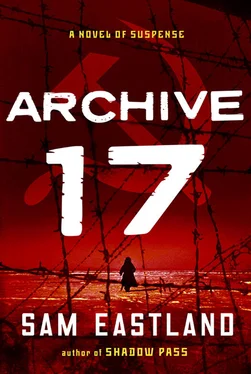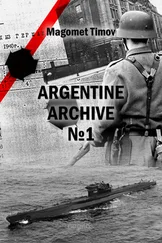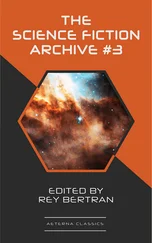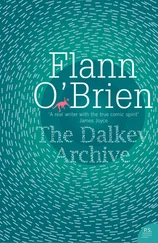Sam Eastland - Archive 17
Здесь есть возможность читать онлайн «Sam Eastland - Archive 17» весь текст электронной книги совершенно бесплатно (целиком полную версию без сокращений). В некоторых случаях можно слушать аудио, скачать через торрент в формате fb2 и присутствует краткое содержание. Жанр: Исторический детектив, на английском языке. Описание произведения, (предисловие) а так же отзывы посетителей доступны на портале библиотеки ЛибКат.
- Название:Archive 17
- Автор:
- Жанр:
- Год:неизвестен
- ISBN:нет данных
- Рейтинг книги:3 / 5. Голосов: 1
-
Избранное:Добавить в избранное
- Отзывы:
-
Ваша оценка:
- 60
- 1
- 2
- 3
- 4
- 5
Archive 17: краткое содержание, описание и аннотация
Предлагаем к чтению аннотацию, описание, краткое содержание или предисловие (зависит от того, что написал сам автор книги «Archive 17»). Если вы не нашли необходимую информацию о книге — напишите в комментариях, мы постараемся отыскать её.
Archive 17 — читать онлайн бесплатно полную книгу (весь текст) целиком
Ниже представлен текст книги, разбитый по страницам. Система сохранения места последней прочитанной страницы, позволяет с удобством читать онлайн бесплатно книгу «Archive 17», без необходимости каждый раз заново искать на чём Вы остановились. Поставьте закладку, и сможете в любой момент перейти на страницу, на которой закончили чтение.
Интервал:
Закладка:
The farmer jumped down from the wall and grabbed an armful of turnips from his cart. He began to jog along the side of the tracks, holding out the turnips.
One of the convicts reached out his hand through the barbed-wire-laced opening and seized one.
More arms appeared, wrists and knuckles traced with blood where the rusty barbs had cut them.
Another hand snatched a turnip from the man’s outstretched hand.
The convicts began to shout, even those who could not see what was happening. The noise took on a life of its own as it spread from wagon to wagon until the roar of their voices drowned out even the sword-clash of the wheels over the tracks. Slowly, the engine pulled ahead.
The old farmer could not keep up.
The turnips spilled from his arms.
The last Pekkala saw of the man, he was standing beside the tracks, hands on his knees, red-faced and puffing milky clouds of breath into the sky.
When the commotion had finally died down, Savushkin made another stab at conversation. “What class of criminal are you?” he asked Pekkala.
“Fifty-nine,” replied Pekkala, remembering the designation he’d been given as part of his cover.
“Fifty-nine! That means you are a dangerous offender! You don’t look like a killer to me.”
“Maybe that’s why I’m so dangerous.”
Savushkin gave a nervous laugh, like air squeaking out of a balloon. “Well, I bet a class 59 has a good tale to tell.”
“Maybe you’ll hear it someday,” replied Pekkala.
“I’ll tell you his story,” said a man pressed up against the wall, “as soon as I remember where I’ve seen him.”
Pekkala glanced at him but said nothing.
The man was shaking with fever. Sweat poured off his face. At some time in his past, he had been cut about the face. Now the white ridges of old scar tissue crisscrossed his cheeks like strands of spiderweb. These wounds had damaged the nerves, leaving a permanently crooked smile, which seemed to mock not only those around him but also the prisoner himself.
Savushkin turned to the man with the knife-cut face. “Brother, you look like you could use a holiday,” he said.
The man ignored Savushkin. His focus remained on Pekkala. “I know I’ve seen you somewhere before.”
The next day, the convict transport pulled into a nameless rail siding in order to let another train pass. This train was heading in the opposite direction. It consisted not of wagons but of numerous flatbeds, all of them stacked with large barrels designed to hold diesel fuel, except that the original fuel markings had been overpainted in bright green letters with the word DALSTROY.
Dalstroy was the state-owned company which managed resources coming out of Siberia. These included timber, lead, and the highly toxic mineral radium which left Borodok each week in containers painted with skull and crossbones. Another discovery in the Borodok mine was crocoite, also known as Siberian Red due to the color of its beautiful crimson crystals, which could be refined to make chromium. Exposure to Siberian Red was known to be just as lethal to miners as the radium.
In addition to controlling the resources, Dalstroy also controlled the workforce. Ten years before, only thirty percent had been prison labor. Now it was over ninety percent. Because Dalstroy had to pay only ten percent of its labor force, it had become one of the richest companies in the world.
The convicts, those who could see out, stared at the dreary procession of barrels with the dull, uncomprehending expressions of transported cattle.
But Pekkala knew what they contained, and he shuddered as he watched them going by. In certain camps, particularly those which were not proving to be as profitable as expected, men who died were packed into these barrels. Their corpses were doused with formaldehyde and then exported all over the country, to be sold as medical cadavers.
In Siberia, the prisoners said, even the dead work for Dalstroy.
After the transport had passed by, Pekkala caught the smell of preserving fluid, familiar to him from his father’s undertaking business back in Finland, drifting sweet and sickening in the cold air.
The locomotive engine roared as it began to move again, but no sooner were the wagons rolling than there was a great screeching of brakes and the whole convoy lurched to a stop. A few minutes later, the train backed once more into the siding, the wagon doors were opened, and the guards ordered everybody out.
The prisoners found themselves in a desolate field of shin-deep snow. The freezing wind cut through their clothes, stirring up white phantoms from beneath their feet.
Some prisoners immediately tried to climb into the wagons again, but the guards held them back.
“What happened?” asked Savushkin.
“The brakes are frozen,” said the guard. “The wheels are slipping. The whole train could come off the rails.”
“How long will we be here?”
“Could be an hour,” replied the guard. “Could be more. The last time this happened we were stuck all night.”
“And you won’t let us back inside until morning?” Savushkin asked.
“We have to take the weight off the wheel springs, or else they might snap from the cold when the train gets moving.” The guard gestured towards a stand of pine and birch trees in the distance. “Head over there. The whistle will sound when it’s time to go again.”
Pekkala and Savushkin set off towards the woods.
Several others followed, heads bowed against the gusts and arms folded across their chest, but they soon gave up and returned to the train, where men were building walls of snow as shelter from the wind.
Ahead, in the grove of trees, the bony trunks of birch appeared and disappeared like a mirage among the sheets of snow.
“We’re all going to freeze to death if they don’t let us back on that train by nightfall!” Savushkin had to shout to make himself heard.
Pekkala knew the other prisoner was right. He also knew the guards didn’t seem to care how many people died en route to the camps. He stumbled forward, feeling the heat drain from the center of his body. Already he’d lost sensation in his ears and nose and fingers.
When they finally reached the trees, Pekkala and Savushkin began to dig a hole around the base of a pine tree, where the snow had drifted chest deep. Protected by its spread of lower branches, they would have a place completely sheltered from the wind.
“I’ll find some fallen branches to lay out on the ground,” Pekkala told Savushkin. “You keep digging.”
Savushkin nodded and went back to work. With his hair and eyebrows rimed in frost, he looked as if he’d aged a hundred years since they left the train.
For the next few minutes, Pekkala staggered through the drifts, gathering deadfall. The branches of the white birch, sheathed in ice, clattered above him like a wind chime made of bones. Arriving back at the hollow with nothing more than a handful of rotten twigs, Pekkala stopped to tear some boughs from a nearby pine tree. While he wrestled with the evergreen branches, he did not hear the person approaching from behind.
“I remember you now,” said a voice.
Pekkala spun around.
The knife-cut man stood right in front of him. “This is the last place on earth I expected to see you, Inspector Pekkala. That’s why I couldn’t place you at first.”
Pekkala said nothing, but only watched and waited.
“I doubt you remember me, but that is understandable,” said the man, brushing his fingertips over his scars. “During my stay in the Butyrka prison, the guards left me with a souvenir I will never forget, just as I have never forgotten that you were the one who arrested me.”
“I have arrested many people,” replied Pekkala. “That is my job.”
Читать дальшеИнтервал:
Закладка:
Похожие книги на «Archive 17»
Представляем Вашему вниманию похожие книги на «Archive 17» списком для выбора. Мы отобрали схожую по названию и смыслу литературу в надежде предоставить читателям больше вариантов отыскать новые, интересные, ещё непрочитанные произведения.
Обсуждение, отзывы о книге «Archive 17» и просто собственные мнения читателей. Оставьте ваши комментарии, напишите, что Вы думаете о произведении, его смысле или главных героях. Укажите что конкретно понравилось, а что нет, и почему Вы так считаете.











